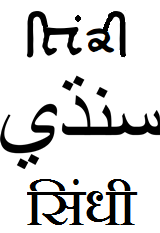Language/Sindhi/Grammar/Questions
Hi Sindhi learners! 😊
In this lesson, we will explore the Sindhi grammar related to questions. We will learn how to form questions and answer them. Sindhi language is the official language of the Sindh province of Pakistan, and is also spoken in India, Afghanistan, and Iran. Sindhi is famous for its unique grammar, sounds, and writing system. To improve your Sindhi Grammar, you can also use the Polyglot Club website. Find native speakers and ask them any questions!
Forming Questions[edit | edit source]
In Sindhi, a question can be formed by adding a question word at the beginning of a sentence or by using intonation. Examples of question words include kaa (what), kija (how), kiveṅ (where), kade (when), kithe (where), kyoṇ (why), ki (which), and keƞd̨o (who).
Example[edit | edit source]
| Sindhi | Pronunciation | English |
|---|---|---|
| کديٺا آئيو؟ | Kadeeta aaiyo? | When did you come? |
| توهان ڪٺا هن ڪجاڻ گھڻيل ٿو؟ | Tuhin keta hin kajanj ghaniil tho? | Where did you hide it? |
| ٻڌٽان ريائت ڪادي | Bhuttan riyaat kadi? | What are the traditions of Bhuttan? |
Answering Questions[edit | edit source]
In Sindhi, there are three ways to answer questions: yes, no, or by repetition of the question. Repetition of the question is often used when the question is not clear or to emphasize the answer.
Example[edit | edit source]
- Person 1: توهان سڄا مجبور آهيو؟ (Tuhin saca majboor aahiyun? - Are you really forced to do this?)
- Person 2: هوون ٿياڻ. (Hoon thiyann. - Yes.)
- Person 1: سچءَءَ مان پلّو مٿھا جي بابت ڀلريو آهين؟ (Sacʻā man pallo methā ji bābat bhalryun āhin? - Do you like sweet rice?)
- Person 2: سچ ڄيڪ ڄڪ. (Sac jhaky jhuk. - Absolutely yes.)
- Person 1: توهان باري ڄاڻ ۾ پوئي؟ (Tuhin baari jhan me pooi? - Did you swim in the river?)
- Person 2: باريءَءَ کيجها. (Baari-a-a kijhaa. - I swam in the river.)
Question Particles[edit | edit source]
In Sindhi, question particles are used to change a statement into a question. Question particles are added at the end of the sentence. Examples of question particles include جي (ji), هو (ho), and هاڻ (han). جي changes an affirmative statement to a question, هو changes a negative statement to a question, and هاڻ creates a rhetorical question.
Example[edit | edit source]
| Sindhi | Pronunciation | English |
|---|---|---|
| تون ۾ڪان گڏ ويس؟ جي. | Ton mékan gadh wees? Ji. | Are there rooms for rent? Yes. |
| اج پوئڻ واري مينو شور شڪار نه تہجي؟ هو. | Ajj pooiñ wari myñu shōr shikar ná tehji? Ho. | Did you not hear the noise while swimming today? No. |
| انگريز ڪتب ٺيون ويا، نه؟ هاڻ. | Angrez kitab thíun weya, ná? Han. | English books are difficult to find, aren't they? This is a rhetorical question. |
Dialogue[edit | edit source]
- Person 1: توهان کان آيا؟ (Tuhin kaan aayo? - Where are you from?)
- Person 2: مان ھيندوستان کان آهيو. (Man Hindustan kan aahiyun.- I am from India.)
- Person 1: توهان کلاس ۾ کيتي سڏنگ ٿيو؟ (Tuhin class me kithe sijngen thiyun? - Where did you sit in the class?)
- Person 2: مان نيڊ ۾ بينڊج تي سڏا. (Man need mé bindz-thi sijjo. - I sat in the front row.)
- Person 1: چو ڀاچا۔ '? (Cho bacha?' - How are you?)
- Person 2: تهاڻ هڪدا ٺيڪ آهيو. (Than hanjo thek aahyu. - I am doing good.)
Sindhi Language Resources[edit | edit source]
If you want to learn more about Sindhi language, culture, and history, you can find more information on Sindhi Language page on Wikipedia.
Sources[edit | edit source]
➡ If you have any questions, please ask them in the comments section below.
➡ Feel free to edit this wiki page if you think it can be improved. 😎
Other Lessons[edit | edit source]
- How to Use Have
- Future Tense
- How to Use Be
- Give your Opinion
- Adjectives
- Conditional Mood
- Pronouns
- Negation
- Plurals

